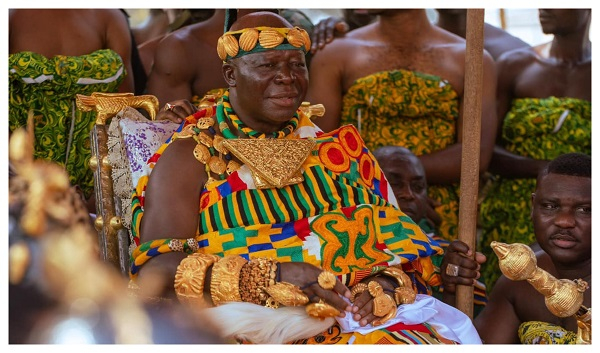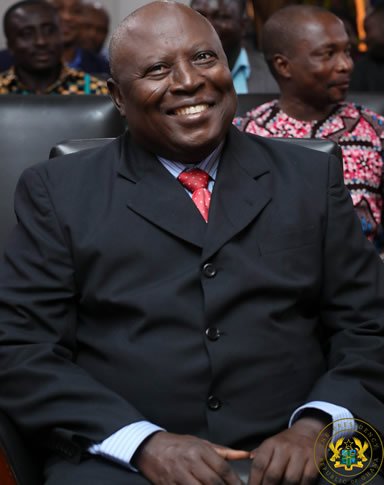The Secret of the Asantehene’s Pyramid Necklace: A 400-Year Migration Story

The Asantehene, the revered King of the Ashanti people, is almost invariably seen in rich Ghanaian regalia and exquisite gold jewelry. His majestic attire not only embodies the luxurious and deeply historical traditions of the Asante culture but also carries profound symbolic weight. Among the most distinctive pieces in his adornment are various gold necklaces and rings, with one particular item, a pyramid-shaped necklace, holding a significance that stretches back over 400 years.
In a captivating video shared on Facebook on June 5, 2025, Nana Hemanhene Nana Apau Wiafe Ababio Sanwoansan, a traditional leader, shed light on the ancient origins and meaning of this iconic pyramid necklace. Speaking in an interview, Nana Sanwoansan linked the ornament to an extraordinary historical journey and an ancestral connection that predates the modern Asante Kingdom.
Nana Sanwoansan recounted a personal experience during one of his international travels where he encountered a striking visual in a museum: a coffin that bore an uncanny resemblance to an image of Otumfuo (the Asantehene) adorned in the same kente cloth. This unexpected encounter sparked a profound realization for the traditional leader.
“I made some comparisons, and once everything was over, they threw a party for us. I spent about ten days there. During the dinner, we were asked to share the experience we had gathered from the expedition. I told them that based on everything I had seen, I could infer that my forefathers lived here,” Nana Sanwoansan explained, detailing his epiphany.
He further elaborated on his observations, stating that he encountered numerous artifacts at the museum that bore striking resemblances to many traditions and objects still held sacred by the Akans today. The discovery was particularly astonishing given the context of meeting African Americans and people from various parts of the world.
“Imagine meeting African Americans and people from all over the world, and then claiming that all the artefacts found there belonged to my forefathers. It was quite surprising. The host asked me why I was making such a claim, and I explained that from the little historical research I had done, I had discovered that the Akans once lived here, along with the Anlo and Ga people, though the Akans played a particularly significant role,” he confidently asserted.
Nana Sanwoansan stated with conviction that certain Ghanaian ethnic groups had indeed resided in that ancient area, citing the resonance between the artifacts found there and the rich Ghanaian culture. He recounted a shared history, explaining, “All lived there before the arrival of King Leopold I, and later, the Romans and Arabs settled in that area. We coexisted for about 400 years before conflicts broke out, prompting us to leave for Mali, where the Old Ghana Empire was eventually established.”
It was during this explanation that Nana Sanwoansan revealed the direct link to the Asantehene’s necklace. “So, I said to the man, ‘Everything I’m telling you stands as evidence that the Akans once lived here.’ However, what I wanted to show you – to help you understand, I showed them a picture of Otumfuo in his full regalia. I pointed to the ornament around his neck and told them that it represents our forefathers. When we left the old Ghana Empire, we trekked through until we reached what is now present-day Ghana,” he narrated, connecting a long-lost past to a tangible present symbol.
He then detailed the reasoning behind the pyramid necklace. When the ancestors were forced to leave that ancient settlement, they could not carry all their possessions. “When our forefathers arrived and established the Kingdom, they said to themselves that even if they couldn’t bring the pyramid with us, they would symbolically carry it around their necks. They tried – had it been something movable, they would have brought it along. But since they couldn’t, they chose to represent it as an ornament around their necks,” he explained, revealing the profound symbolism of the piece.
Nana Sanwoansan further elucidated that this is precisely why the necklace is known as “Adaaboso,” a term that literally translates to “on the chest” (3da wo bo so in Twi), shortened to “Adaaboso.”
“The truth is, the Whites themselves know who the original people are. They know who those things rightfully belong to. So, you may notice that at certain times, our overlord wears up to three of them around his neck – sometimes two,” Nana Sanwoansan noted, alluding to broader historical knowledge of ancestral origins. “During grand durbars, he adorns himself with these ornaments. Even though we couldn’t bring the actual pyramid, it’s still worn around our necks. That is the Adaaboso. Only someone with a true understanding of these things will grasp their significance,” he concluded, emphasizing the deep, hidden meaning embedded in the Asantehene’s powerful regalia. This revelation provides a compelling narrative of migration, cultural preservation, and identity, encapsulated within a single piece of jewelry worn by one of Africa’s most revered monarchs.
Source: http://thepressradio.com





